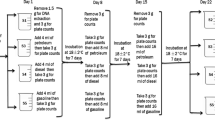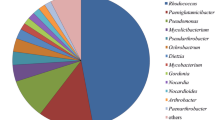Abstract
Hydrocarbons persist in Antarctic soils when fuel oils such as JP8 jet fuel are spilled. For clean-up of hydrocarbon-contaminated soils in Antarctica, bioremediation has been proposed using hydrocarbon-degrading microbes indigenous to Antarctic soils. A number of alkane-degrading bacteria have been isolated previously from Antarctic soils. In this paper we describe the direct isolation of aromatic hydrocarbon-degrading bacteria from oil-contaminated Antarctic soil. Isolates that grew on JP8 jet fuel were characterised for their ability to degrade aromatic and aliphatic hydrocarbons and for growth at a range of temperatures. All isolates were gram-negative, oxidase-positive, rod-shaped bacteria. Representative strains were identified using 16S rDNA sequence analysis as either Sphingomonas spp. or Pseudomonas spp. Aromatic-degrading bacteria from Antarctic soils were psychrotolerant and appear similar to those found worldwide.
Similar content being viewed by others
Explore related subjects
Discover the latest articles and news from researchers in related subjects, suggested using machine learning.Author information
Authors and Affiliations
Additional information
Accepted: 27 September 1999
Rights and permissions
About this article
Cite this article
Aislabie, J., Foght, J. & Saul, D. Aromatic hydrocarbon-degrading bacteria from soil near Scott Base, Antarctica. Polar Biol 23, 183–188 (2000). https://doi.org/10.1007/s003000050025
Issue Date:
DOI: https://doi.org/10.1007/s003000050025




